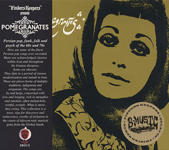|
|
 |
Dusted Reviews
Artist: V/A Album: Pomegranates: Persian Pop, Funk, Folk and Psych of the 60s and 70s Label: B-Music Review date: Apr. 7, 2010 |

|
|
|
 |
Pomegranates is a 16-track collection comprising assorted vinyl 45s (or “chehel-o-panj dorehs”) released in Iran during the1960s and ‘70s. A fascinating assortment of sounds, the tracks on Pomegranates showcase the distinctive styles coming out of the Iranian music industry of the era, while at the same time offering a kind of fun-house mirror of the contemporaneous western pop industry. There are identifiable strands of funk, psych, folk, R&B and widescreen cinematic pop, though everything is funneled through the vibrant lens of a nation on the precipice of political and cultural upheaval.
Written by the curator of Pomegranates, Arash Saedinia (whose mother’s personal record collection was the source for many of the songs), the liner notes are nearly as interesting and enjoyable as the music. Tracking the history of a record business reminiscent of Kingston in the heyday of rocksteady and early reggae, Saedinia describes the sundry small-press labels, record shops, studios and artists on the scene, and places the music in its proper historical context in late-twentieth-century Iran.
Largely unknown to all but collectors of Persian music, Pomegranates features genuine stars of the era, including the groundbreaking guitar fusionist Kouroush Yaghmaie, subversive style-icon Googooshi, and Persian funksters Zia and Mohammad Nouri. To Western ears, tracks such as Soli’s “Negar” might initially sound, for lack of a better word, foreign, but they quickly become familiar, rooted as they are in a universal sense of body-moving rhythm. Indeed, Western funk and R&B grooves seep in everywhere here, with breaks that bang so hard one could momentarily be forgiven for expecting Rakim to drop in for a mid-song guest shot. Other sonic threads here evoke the era’s psychedelic leanings. Admittedly, no one track is any more lysergic in spirit than say, “Incense and Peppermints,” but it’s clear that the grooves in Mehrpouya’s “Soul Raga” could easily traverse continents, from the Haight to Tehran and back again.
What is perhaps most affecting about Pomegranates is how it was so simply and lovingly conceived as a document of the art and culture of a people. At the risk of sounding didactic or overtly political, it is impossible for me not to consider this compilation in the light of the United States’ still veiled yet no doubt deliberate warmongering toward Iran. Amidst the government’s inevitable manufacturing of aggression and the outrage in response to it, the story of the aforementioned people will go largely unnoticed. Certainly the citizenry of any nation we invade plays a role in how we frame the dialogue. But I imagine it would be somewhat stunning for much of the American populace to learn that Iranians make pop music and always did: as a method of resistance, as a way to maybe make a little money, and certainly as a means to get down.
Pomegranates stakes its claim in this narrative, filling in blanks in an essential story that is inherently political but also about something so much more enriching. Familiarity with the music here surely won’t halt a march to war. Such a thought would be both naïve and out of proportion with the subject. Nonetheless, I have to believe that possessing a deeper understanding of people through a common narrative — for our purposes the records, the singers, the songs — as opposed to a geopolitical one makes it much harder to want to kill them.
By Nate Knaebel
|







